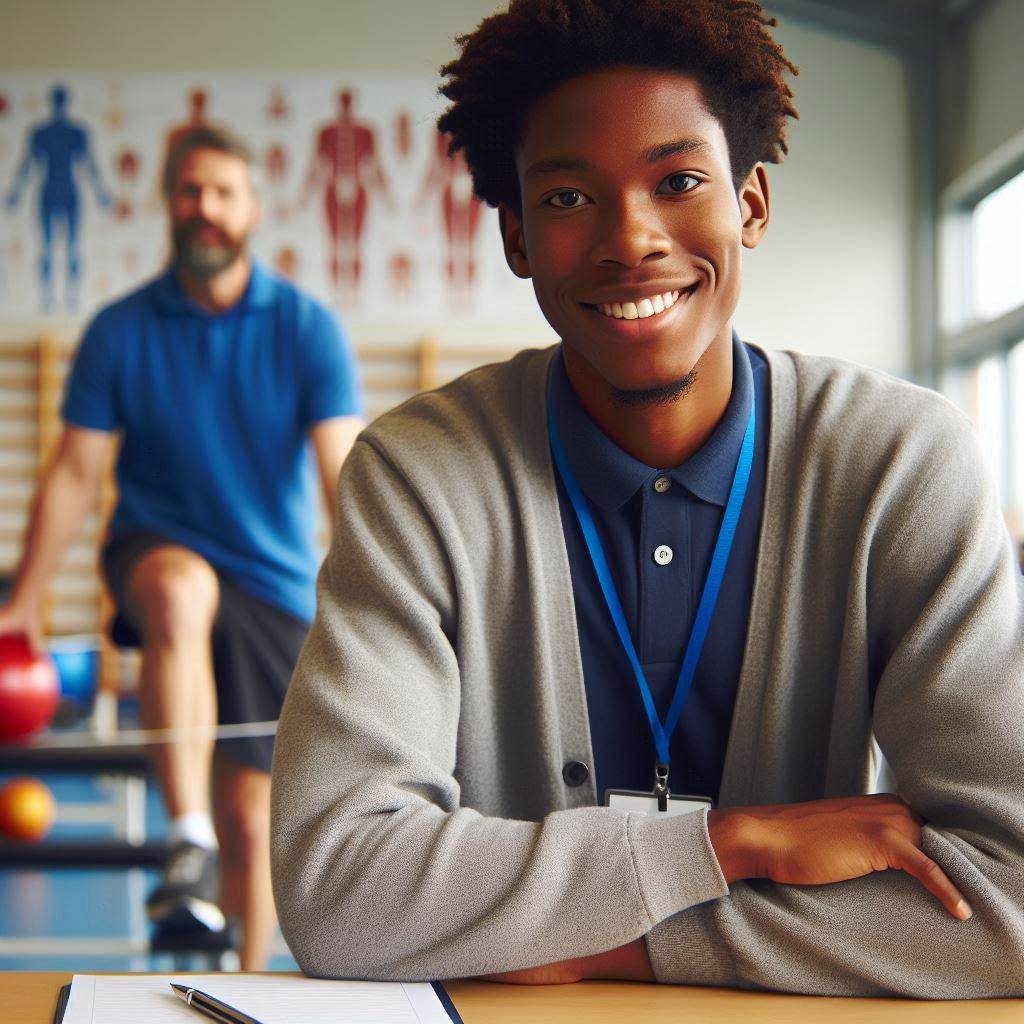Introduction
Physical and health education in Nigeria is a vital component of the education system, encompassing activities that promote physical fitness, overall well-being, and healthy lifestyle choices.
Physical and health education play a crucial role in promoting a healthy and active lifestyle among Nigerian students.
These subjects help in improving physical fitness, developing motor skills, and enhancing mental well-being.
In a country like Nigeria, where lifestyle-related diseases such as obesity, diabetes, and hypertension are on the rise, it is essential to emphasize the importance of physical and health education in schools.
By educating students about the significance of regular exercise, proper nutrition, and overall health, we can empower them with the knowledge and skills to make informed decisions that will benefit their well-being in the long run
Additionally, physical and health education can also contribute to the holistic development of students by instilling values such as teamwork, discipline, and perseverance.
Overall, physical and health education in Nigeria plays a vital role in shaping the future generation to lead healthy and active lives.
History of Physical and Health Education in Nigeria
Physical and Health Education in Nigeria has a rich history that dates back to the pre-colonial era.
Let’s take a closer look at how this important field has evolved over time.
Overview of the Evolution of Physical and Health Education in Nigeria
Physical and Health Education in Nigeria has undergone significant transformations over the years.
In the pre-colonial era, physical activities were an integral part of the daily lives of Nigerians.
These activities were not only for leisure but also for preparing for war and religious ceremonies.
With the advent of colonialism, western education was introduced to Nigeria, including physical education.
The British colonial masters introduced organized physical education programs in schools to promote health and physical fitness among students.
Key Developments and Milestones in Physical and Health Education
The establishment of the Nigerian Institute of Sports in 1961 marked a significant milestone in the development of physical education in Nigeria.
This institute was tasked with training sports instructors and organizing sports events at the national level.
In 1966, the National Teachers’ Institute was established to train physical education teachers and promote the teaching of physical education in schools across the country.
The National Policy on Education in 1977 highlighted the importance of physical and health education in the Nigerian school curriculum.
This policy mandated the inclusion of physical education as a core subject in primary and secondary schools.
In 1990, the Nigerian government launched the National Sports Policy to promote sports development and physical fitness among Nigerians.
This policy aimed to harness the potential of sports and physical activities in promoting health and national unity.
These key developments and milestones have played a crucial role in shaping the current landscape of physical and health education in Nigeria.
Today, physical education is an integral part of the Nigerian school curriculum, aimed at promoting physical fitness, mental well-being, and overall health among students.
Read: Mental Health Support in Nigerian Primary Schools
Current State of Physical and Health Education in Nigeria
Examination of the Current Curriculum for Physical and Health Education in Schools
The current curriculum for Physical and Health Education in Nigeria focuses on a holistic approach to the well-being of students.
It includes a variety of topics such as nutrition, exercise, mental health, and reproductive health.
Physical activities like sports, games, and fitness exercises are included to promote physical fitness.
Health education topics cover areas like disease prevention, personal hygiene, and healthy lifestyle choices.
The curriculum is designed to educate students on the importance of maintaining a balanced and healthy lifestyle.
Students are taught the benefits of physical activity and how it can improve their overall well-being.
The curriculum also emphasizes the importance of developing good habits early in life.
Challenges Facing the Implementation of Physical and Health Education Programs
Despite the importance of Physical and Health Education, there are several challenges facing its effective implementation in Nigeria.
One of the major challenges is the lack of qualified teachers who are trained in Physical and Health Education.
Many schools do not have the necessary resources and facilities to support Physical and Health Education programs.
There is also a lack of awareness among parents and students about the importance of Physical and Health Education.
Some schools prioritize academic subjects over Physical and Health Education, leading to its neglect.
Another challenge is the prevalence of sedentary lifestyles among students, which makes it difficult to promote physical activity.
Limited time allocated to Physical and Health Education in the school day is another obstacle to its effective implementation.
Inadequate funding for Physical and Health Education programs is a significant barrier to improving the quality of education in this area.
The lack of monitoring and evaluation mechanisms to assess the impact of Physical and Health Education programs is also a challenge.
Transform Your Career with Expert Guidance
Get personalized mentorship consulting that’s tailored to your unique path. Our expert advice is actionable and exclusive.
Get StartedIn essence, while there is a strong curriculum for Physical and Health Education in Nigeria, there are significant challenges hindering its effective implementation.
Addressing these challenges is crucial to ensure that students receive a well-rounded education that promotes their overall well-being.
Benefits of Physical and Health Education
The benefits of physical and health education for individuals and society
Physical and health education provide individuals with the necessary knowledge and skills to maintain a healthy lifestyle.
By understanding the importance of regular exercise and nutritious diet, individuals can improve their overall well-being.
Physical education helps in developing physical fitness, strength, agility, and flexibility, leading to a healthier body.
Health education focuses on disease prevention, teaching individuals how to make informed decisions about their health.
Promoting a healthy lifestyle through education can reduce the risk of chronic diseases such as diabetes, heart disease, and obesity.
Physical activity has been linked to improved mental health, reducing stress, anxiety, and depression.
By instilling healthy habits from a young age, physical and health education can help prevent future health issues.
Educating individuals on the benefits of exercise and proper nutrition can lead to increased energy levels and overall productivity.
Physical and health education also play a crucial role in improving social skills and promoting teamwork among individuals.
Through physical education, individuals learn the importance of sportsmanship, fair play, and respect for others.
Importance of promoting a healthy lifestyle and preventing diseases
Encouraging a healthy lifestyle through education can help reduce healthcare costs associated with treating preventable diseases.
Preventive measures such as regular exercise and balanced nutrition can lower the burden on healthcare systems and improve public health.
By promoting a healthy lifestyle, individuals can increase their lifespan and quality of life, enjoying more years of vitality.
Preventing diseases through education can lead to a decrease in mortality rates and an overall healthier population.
Healthy habits learned in physical and health education can be passed down to future generations, creating a ripple effect of wellness.
Educating individuals on disease prevention empowers them to take control of their health and make proactive choices.
A healthy lifestyle can boost immune function, reducing the risk of infections and promoting faster recovery from illnesses.
Preventing diseases through education contributes to the overall well-being and happiness of individuals, leading to a more fulfilling life.
Promoting a healthy lifestyle not only benefits individuals but also has positive effects on society as a whole, creating a healthier community.
By focusing on prevention and promoting wellness, physical and health education can help build a stronger, more resilient society.
Read: Industry Collaboration with Nigerian Construction Tech Schools
Role of Government in Promoting Physical and Health Education
When it comes to promoting physical and health education in Nigeria, the role of the government is crucial.
The government plays a significant part in shaping and implementing initiatives to improve the overall well-being of its citizens.
Overview of government initiatives and policies related to physical and health education
The Nigerian government has implemented various programs aimed at promoting physical and health education in schools.
One of the key initiatives is the incorporation of physical education into the national curriculum for primary and secondary schools.
These initiatives are designed to instill healthy habits and values in young students from an early age.
The government also provides training and resources for teachers to effectively deliver physical and health education in schools.
Additionally, the government has established partnerships with organizations and NGOs to support and expand physical and health education programs.
Challenges and opportunities for government intervention in the field
Despite these efforts, there are several challenges that hinder the effective promotion of physical and health education in Nigeria.
One major challenge is the lack of adequate funding for physical education programs in schools.
This results in a shortage of resources and equipment, limiting the quality of education provided to students.
Another challenge is the lack of qualified teachers trained in physical education, leading to subpar instruction and guidance for students.
Furthermore, there is a lack of awareness and emphasis on the importance of physical and health education in schools and communities.
However, there are opportunities for the government to intervene and address these challenges effectively.
By increasing funding for physical education programs and providing resources to schools, the government can improve the quality of education provided to students.
The government can also invest in training programs for teachers to enhance their skills and expertise in delivering physical and health education.
Moreover, raising awareness about the benefits of physical and health education can help change attitudes and behaviors towards leading a healthy lifestyle.
In fact, the government plays a vital role in promoting physical and health education in Nigeria.
By implementing effective initiatives and policies, the government can improve the overall well-being of its citizens and contribute to a healthier society.
Read: Future Trends in Nigerian Construction Technology

Importance of Sports and Physical Activities
When it comes to physical and health education in Nigeria, one cannot overlook the importance of sports and physical activities.
Let’s delve deeper into why these elements play a crucial role in the overall well-being of individuals.
Role of sports and physical activities in physical and health education
Sports and physical activities are not just about competition or leisure; they are essential components of a comprehensive physical and health education curriculum.
In Nigeria, incorporating sports and physical activities into the school curriculum is seen as a way to promote a holistic approach to education.
Physical education classes provide students with the opportunity to engage in various sports and activities, contributing to their physical fitness, motor skills development, and overall health.
These classes also teach students the importance of teamwork, discipline, and perseverance, which are valuable life skills that can be applied beyond the sports field.
Furthermore, sports and physical activities in schools serve as a platform for students to discover their talents and interests.
By participating in different sports and activities, students can explore their strengths and weaknesses, develop their self-confidence, and cultivate a lifelong passion for physical fitness.
Impact of sports on individual health and development
The benefits of sports and physical activities extend beyond the physical aspect; they also have a significant impact on individual health and development.
Regular participation in sports has been linked to numerous health benefits, including improved cardiovascular health, increased muscle strength and endurance, and enhanced flexibility and coordination.
Sports and physical activities help individuals maintain a healthy weight, reduce the risk of chronic diseases such as obesity, diabetes, and hypertension, and improve overall mental health and well-being.
Engaging in sports can boost one’s mood, reduce stress and anxiety, and promote better sleep patterns.
Moreover, participating in sports fosters social interaction and camaraderie, allowing individuals to build meaningful relationships, develop communication skills, and enhance their emotional intelligence.
Sports also teach important values such as sportsmanship, respect for others, and resilience in the face of challenges.
For children and adolescents, sports play a crucial role in promoting healthy growth and development.
Regular physical activity during childhood and adolescence is associated with improved bone strength, motor skill development, and cognitive function.
It also helps in preventing the onset of lifestyle-related diseases later in life.
Overall, sports and physical activities are indispensable components of physical and health education in Nigeria.
By emphasizing the importance of sports in education and promoting regular physical activity, schools can contribute to the holistic development of students and instill lifelong habits of health and wellness.
Read: Top Universities for Business Education in Nigeria
Strategies for Improving Physical and Health Education in Nigeria
When it comes to enhancing physical and health education programs in Nigeria, there are several strategies that can be implemented to address the current challenges.
These strategies are crucial for the overall well-being of the population and the development of a healthier nation.
Potential strategies
- Introducing comprehensive physical and health education curriculum in schools.
- Increasing funding and resources for physical education programs.
- Training and development of teachers in physical and health education.
- Community involvement in promoting physical activities and healthy lifestyles.
- Integration of modern technology in physical education classes.
- Collaboration with health professionals to provide accurate and up-to-date information.
Importance of Collaboration
Collaboration between the government, schools, and communities is essential for the success of physical and health education programs in Nigeria.
This partnership ensures a holistic approach to promoting healthy living and addresses the various needs of the population.
Government
- Allocate sufficient budget for physical and health education programs.
- Implement policies that prioritize physical education in school curriculums.
- Support training programs for teachers to enhance their skills in teaching physical education.
- Establish monitoring and evaluation mechanisms to track the progress of these programs.
Schools
- Develop comprehensive physical education programs that cater to all students.
- Provide adequate facilities and equipment for physical activities.
- Encourage student participation in sports and fitness clubs.
- Collaborate with health professionals to organize regular health screenings and workshops.
Communities
- Promote community events that emphasize physical activities and health awareness.
- Engage local leaders and organizations to support physical education initiatives.
- Establish partnerships with schools to facilitate after-school sports programs.
- Encourage families to prioritize physical activities and healthy eating habits.
In short, improving physical and health education in Nigeria requires a multi-faceted approach that involves stakeholders at all levels.
By implementing these strategies and fostering collaboration between the government, schools, and communities, Nigeria can create a culture of health and wellness that benefits the entire population.
Incorporating Technology in Physical and Health Education
Overview of how technology can be used to enhance physical and health education programs
Technology has revolutionized the field of physical and health education in Nigeria.
With the advancement of digital tools and resources, educators now have innovative ways to engage students and promote healthy lifestyles.
Here are some key ways technology can be integrated into physical and health education programs:
- Interactive learning platforms: Teachers can use online platforms and educational apps to create interactive lessons that make learning fun and engaging for students.
These platforms can include videos, games, quizzes, and other interactive elements that help students retain information better. - Virtual reality and simulations: Virtual reality technology can be used to create immersive experiences that allow students to explore different environments and scenarios related to physical and health education.
For example, students can virtually visit a gym, learn proper exercise techniques, or practice healthy eating habits in a simulated environment. - Fitness trackers and wearable devices: Fitness trackers and wearable devices have become popular tools for monitoring physical activity, tracking fitness goals, and promoting healthy living.
Teachers can incorporate these devices into their curriculum to help students set fitness goals, track their progress, and make healthier choices. - Online resources and videos: There are a plethora of online resources and videos available that can supplement traditional physical and health education lessons.
Teachers can use educational videos, online articles, and other resources to provide students with additional information and resources to enhance their learning.
Examples of innovative tools and resources for promoting physical and health education
- Fitness apps: There are many fitness apps available that can help students track their physical activity, set fitness goals, and access workout routines.
Apps like MyFitnessPal, Nike Training Club, and Fitbit Coach are popular choices for students looking to improve their fitness levels. - Virtual reality games: Virtual reality games like Beat Saber, Box VR, and Supernatural offer immersive and engaging workout experiences that make exercise fun and entertaining.
These games can be used in physical education classes to motivate students to be more active and enjoy exercising. - Health education websites: Websites like KidsHealth.org, CDC.gov, and Healthline.com offer valuable information on various health topics, including nutrition, exercise, mental health, and more.
Teachers can use these websites to supplement their lessons and provide students with up-to-date information on health-related issues. - Online fitness challenges: Teachers can organize online fitness challenges that encourage students to be more active and lead healthier lifestyles.
Challenges like step counting competitions, workout challenges, or healthy eating challenges can motivate students to make positive changes in their daily routines.
In general, technology has the potential to greatly enhance physical and health education programs in Nigeria.
By incorporating innovative tools and resources into their curriculum, educators can engage students, promote healthy habits, and empower them to lead active and healthy lives.
Discover More: Advancements in Nigerian Agricultural Science Research
Future Prospects of Physical and Health Education in Nigeria
The future of physical and health education in Nigeria
As the awareness of the importance of physical and health education grows in Nigeria, the future looks promising.
The government’s commitment to improving the education sector includes a focus on physical and health education.
With advancements in technology, there are opportunities to incorporate digital tools to enhance teaching methods.
Collaborations with international organizations can bring valuable resources and expertise to the field.
The recognition of physical and health education as a key component of holistic development will drive its growth.
Opportunities for growth and development in the field
Increased investment in training programs for physical and health educators will improve the quality of instruction.
Partnerships with sports organizations can create pathways for students to pursue careers in athletics and health.
Research initiatives focusing on the impact of physical and health education can provide valuable insights for future strategies.
Integration of physical and health education into the national curriculum will ensure its sustainability and relevance.
Public awareness campaigns can help educate the population on the importance of physical activity and healthy lifestyle choices.
Overall, the future of physical and health education in Nigeria is bright, with opportunities for growth and development that can positively impact the well-being of the population.
Conclusion
We have discussed the importance of physical and health education in Nigeria. It is crucial for promoting overall well-being and preventing diseases.
Key points discussed include the benefits of regular exercise, proper nutrition, and mental health support through education.
These factors are essential for maintaining a healthy lifestyle.
As a call to action, we urge the Nigerian government to prioritize physical and health education in schools.
This will empower the younger generation with the knowledge and skills to lead healthy lives.
We also encourage communities and families to support and participate in physical and health education initiatives.
Together, we can create a culture of wellness and longevity in Nigeria.
Let us work towards a healthier nation by investing in quality physical and health education programs for all individuals.
It is time to prioritize the well-being of our citizens and build a stronger, healthier Nigeria.




